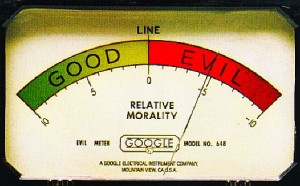Does the Web make us evil? no comments

The Web provides a unique set of contexts and questions to study a variety of topics. One area where this is particularly evident is our online presence. It is well documented that people’s behaviours are different in an online situation, for instance trolling and hactivism. Whilst these differences are often attributed to the anonymity that the web offers, there are many examples of them manifesting in identifiable circumstances, such as on social networking sites. As a means to focus my research, I will likely concentrate on the activities of people on social networking sites with a view to understanding the behaviour behind them.
This issue of a difference between our online selves and ‘real’ selves can be examined through many different lenses. There are legal aspects to this such as if and how laws are applied on the Web. Economically we can look at the differences between shopping on- and offline. Broadly speaking, these deal with practical concerns relating to online personas. From a more abstract perspective, and underpinning the practical approach, we can question the way we think.
Considering how much of it I purportedly do for a living, until recently I had never given much consideration to understanding the processes behind. A fascinating idea I have come across is the difference between how we think and how we think we think. This is something where psychology and philosophy intertwine.
Psychology
Psychology has always been associated with analysing social issues and behaviours. The psychology of online behaviour is a very broad subject with a great deal of conflicting conclusions. In recent months, an area that has unfortunately come to the fore is the phenomenon of depression and bullying that exists on and via social networking sites, and one of the areas I will look at is the ethics of online behaviour. In particular I am keen on looking into how our morals, or perception of morals, are formed. The reasons behind any disparity between offline and online ethics will provide an insight into this.
Philosophy
Morality is an issue that has been extensively studied from a philosophical perspective. Whilst psychology is useful in examining the reasoning behind a code of conduct, philosophy concerns itself more with the actual code. Various philosophers have attempted to explain what morality is and this provides a more direct approach to understanding its formation. The vast majority of these theories have been developed in the absence of the Web which hence provides a rigorous testing ground for them.
Naively speaking, psychology is the study of how we think whilst philosophy is the study of what we think. Of course, each of these fields can claim to subsume the other ipso facto. Rather than trying to combine these two fields in a hierarchical relation, I will attempt to unite them in a more balanced manner.
The topic of ethics can be viewed as a part of a larger debate into our attitude to socialising on the Web. Depending on the scope of the topic, this is something I will hope to extend to.